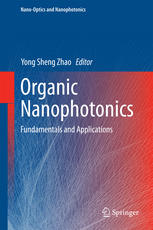

Most ebook files are in PDF format, so you can easily read them using various software such as Foxit Reader or directly on the Google Chrome browser.
Some ebook files are released by publishers in other formats such as .awz, .mobi, .epub, .fb2, etc. You may need to install specific software to read these formats on mobile/PC, such as Calibre.
Please read the tutorial at this link: https://ebookbell.com/faq
We offer FREE conversion to the popular formats you request; however, this may take some time. Therefore, right after payment, please email us, and we will try to provide the service as quickly as possible.
For some exceptional file formats or broken links (if any), please refrain from opening any disputes. Instead, email us first, and we will try to assist within a maximum of 6 hours.
EbookBell Team

5.0
50 reviewsThis comprehensive text collects the progress made in recent years in the fabrication, processing, and performance of organic nanophotonic materials and devices. The first part of the book addresses photonic nanofabrications in a chapter on multiphoton processes in nanofabrication and microscopy imaging. The second part of the book is focused on nanoscale light sources for integrated nanophotonic circuits, and is composed of three chapters on organic nano/microcavities, organic laser materials, and polymer light-emitting electrochemical cells (LECs). The third part is focused on the interactions between light and matter and consists in three chapters, including the propagation of light in organic nanostructures and photoswitches based on nonlinear optical polymer photonic crystals and photoresponsive molecules, respectively. The final chapter of this book introduces the integration of miniaturized photonic devices and circuits with various organic nanophotonic elements.
The practical case studies demonstrate how the latest applications actually work, while tables throughout the book summarize key information and diagrams and figures help readers to grasp complex concepts and designs. The references at the end of each chapter can be used as the gateway to the relevant literature in the field. Moreover, this book helps researchers to advance their own investigations to develop the next generation of miniaturized devices for information processing, efficient energy conversion, and highly accurate sensing.
Yong Sheng Zhao, PhD, is a Professor at the Institute of Chemistry, Chinese Academy of Sciences (ICCAS), China.